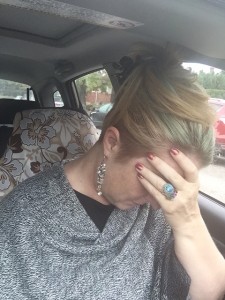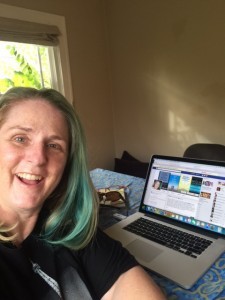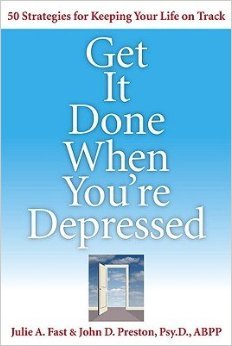Julie A. Fast's Blog, page 38
January 5, 2016
Bipolar Disorder on the Road: Bipolar Disorder and Traveling the World
One of my future book projects covers the topic of how to travel safely and stably when you have bipolar disorder. This book has been in the draft process for quite awhile, but the topic is so timely I thought…… Julie, just get the tips out there. People need them! Here’s the introduction to the book. The pictures are from Japan and China in the 90’s. I used to just pick up and go anywhere! Who knew what mood would follow? I move to Europe in two months. I’ll share my process on this blog and on my Julie A. Fast Facebook page. I’m prepping for the time change now- and am working hard to stay stable. We CAN travel successfully when we have bipolar disorder. It just takes a plan.
Bipolar Disorder on the Road: Four Steps to Successful and Stable Travel
An Introduction
The smoother the travel, the more stable the mood.
For most of my life I traveled two to three times a year. Between 1982 and 1995, I visited Europe many times, lived in Japan for three years, traveled all over Asia, went to school in China and frequently went between my home in Seattle and my mother’s home in Hawaii. All of this travel involved time changes that inevitably led to mood swings. I had NO idea why my moods would change so much when I traveled.
When I was finally diagnosed with bipolar disorder in 1995 at age 31, I had to modify my travel lust in order to get the illness more under control. I only traveled to Hawaii for quite a few years after my diagnosis and worked diligently on using my Health Cards to keep myself stable.
I moved to France for six months in 2002 with my then partner Ivan (who is French )and finally moved to my home in Portland, Oregon and have been here ever since. I always assumed I would continue to travel the world throughout my life. But the reality is that travel is tough for me. To be blunt, travel makes my bipolar disorder a lot worse.
Since starting my management system, I’ve paid daily attention to the triggers of bipolar disorder. And one of the strongest triggers for many people with this illness is traveling. I’m now happy to announce that I can once again travel all over the world, but it takes a lot more planning than in the past in order to make sure the trip is successful and stable. This book explains the four steps I use every time I travel. Bipolar disorder management takes a lot of practice, but it is possible to find what works and get your life to a place where traveling is fun!
*** end of introduction***
Check back to the blog for my travel tips.
Julie
Related posts:
Bipolar Disorder on the Road Book Excerpt 2: Why does travel trigger bipolar disorder symptoms?
It’s finally happening. Hello Las Vegas!
I’m taking a trip to the east coast……
January 4, 2016
Bipolar Disorder is a Fascinating Illness
 A few ideas to ponder. I’d love to hear your views as well.
A few ideas to ponder. I’d love to hear your views as well.1. Restlessness. This can be mental or physical. It’s a definite symptom of mania, but I also think it’s a personality trait of many of us with this illness. We simply crave change and can have trouble saying no to something new, even though it’s not good for us!
2. Bipolar disorder is a sleep disorder. All people with bipolar disorder have sleep problems. The more we learn about the genetics of the circadian rhythm, the closer we get to a bipolar disorder cure. I believe this!
3. Bipolar disorder is a lifestyle illness– this means that our lifestyle choices affect our moods. Changes in lifestyle can be as powerful as medications.
4. Much of what we know is still in the chicken or the egg stage. For example, does lack of sleep cause mania or do we have sleep problems because the mania is already there? It’s fascinating.
What parts of bipolar disorder do you find interesting? Julie
Related posts:
Mania and Sleep Reader Comments
Bipolar Illness treatment….
Hello Australia! Bipolar Disorder and Light Exposure. Four Keys to Successfully Manage the Illness on Sunny Days
January 2, 2016
Bipolar Disorder Depression: An Unhappy Morning from My Past
 The post below is from many years ago- it’s important to look back and see how far we have come. I was depressed off and on for 30 years. I went through intense, suicidal downswings that could last for months and sometimes years at a time. I never thought I would see the day where bipolar depression didn’t rule my life.
The post below is from many years ago- it’s important to look back and see how far we have come. I was depressed off and on for 30 years. I went through intense, suicidal downswings that could last for months and sometimes years at a time. I never thought I would see the day where bipolar depression didn’t rule my life.
Depression no longer rules my life. I’m rarely depressed and when I am, I have tools to deal with it. It’s still scary and intense and I hate it- just as you probably hate your own depression, but I want to let everyone know that no matter how long a person has been depressed, life can change. I read over the post below and thought to myself- how did I survive this? How did I live with this almost every day and not just give up? The answer is in my books- I created a treatment plan and used it even when I believed it would never work. Then it worked. I want the same for you or a loved one. Let’s make 2016 the most stable year of your life. If you care about someone with bipolar disorder, you can learn to help them find stability. I don’t want us to live like I used to live- here is the post. Isn’t it great that I got better. It means you can get better too. Julie
My post from the past:
I woke up depressed- nothing new unfortunately. I knew it was going to be a tough morning- but it doesn’t have to be a tough day!
My feet felt like they were tied to concrete bricks. It would be so much easier to just stay in bed- or so my mind wanted me to believe. That’s a lie of course- I reminded myself that there is NEVER an occasion where staying in bed while depressed is a good decision. Beds are for sleeping. I said this to myself, “Beds are for sleeping Julie. You don’t stay in bed when you’re depressed.”
Putting on my shoes helped me move forward- making myself get dressed kept me moving out the door.
It’s hard to get going when your first thought in the morning is that there is no purpose to your life. I have to remind myself that I didn’t feel this at all yesterday and that this is depression talking. Now I have to get out and work on my book proposal- see friends and get going! I will not listen to this depression. It’s an illness and it’s not real.
Julie
***
I’m so thankful this depression is no longer in my life ever day. I want the same for you.
Related posts:
Pt 2..Help for Bipolar Depression: Getting Out of Bed in the Morning
Help for Bipolar Depression: Getting out of Bed in the Morning
A Bipolar Disorder Blast from the Past.. it’s always something!
Julie A. Fast Bipolar Disorder Coaching News 2016
As many of you know, I’m fulfilling a life long dream and moving back to Europe in 2016. My work will stay the same with one change- I’m not currently taking long term coaching clients.
For now, I’m offering a one time 90 minute session where we tackle one problem. I like this format. I ask clients to send me their situation and we choose one problem to face and fix. I have worked with partners who are not sure to stay or go, parents who want help getting a child off marijuana, parents who have a child who is having trouble in school and just a few days ago, a client where the mother wanted to let her daughter get more out in the world now that her bipolar disorder is more under control. Click here to visit my coaching page for more information.
Please note that I’m still working with my current clients, but am only available for this one time session for new client- until further notice. I normally do not work directly with people who have mental health disorders, but I can do so in this short format.
My new book query is moving forward- I’m writing through the holiday stress. If you have a project due, I want to encourage you to work no matter what- even if it’s for 10 minutes at a time. I have learned that getting things done is about persistence and not necessarily time. I still have to record a call I did in the spring- and you know what, I will get it done eventually. When you have bipolar disorder, life gets modified.
Julie
Related posts:
Julie Fast Bipolar Coaching: What I’ve Learned from Coaching Family Members and Partners
Accepting New Family and Partner Coaching Clients
Accepting New Family and Partner Coaching Clients
December 10, 2015
Bipolar Disorder Medication Side Effects: Lamictal (lamotrigine)
I’m reading over my older posts- so much of what I’ve written can still be used today- medications don’t change and our needs don’t change. I was on Lamictal for many years and it helped me get through a serious four year depression. My depression is better now and I am off the drug. Medications can help us through tough depression times- and when we are better, we can lower doses or go off the medications. Unfortunately, it’s not the same with mania. For many people, staying on mania drugs as a prevention tool is essential, but even then, doses can change and different medications can be found that have less side effects. No one and I mean no one really wants to take medications for bipolar disorder, but if you’re like me, medications are sometimes the only option. Keep an open mind- keep using the management plan I write about in my books and always keep looking for new and better ways to manage this illness. If medications are needed, I highly recommend Lamictal. It save my life and helped me move into a depression free world. You can get better! Here is the question!
Hi Julie,
I was taking generic Lamictal for 4 weeks during December, but around Christmas the side effects-headache, anxiety-became too much on 50mg. I know you’re not a doctor, but in your experience do these subside over time. I’m a street musician in Portland and just getting turned on to your bi-polar crusade. Your work looks pretty amazing.
Regards,
Ted
Hi Ted,
Well, side effects are so tricky as they depend on the person. For example, I take 500mg of generic Lamictal (also called generic Lamotrigine) and have more side effects when my dose gets too low!
The normal Lamictal dose is 250mg- but that is just an average. What matters is that it works- the dose depends on the person taking the meds.
My first question would be just that- did it work? If it did, you may want to wait out the side effects if you can- if they are even moderately tolerable. It’s such a great drug when it works, but the side effects can be tough. I had them for three months until they got better. Mine were severe neck stiffness and breathing problems. Now I get the restless legs and twitching! It is an anti epileptic drug, so it makes sense it would really affect our nervous systems. If the side effects really are impossible to live with, you have some options.
If you are well enough to function in terms of bipolar- then you can talk to your doctor about going onto a lower dose until you can tolerate the side effects and then very slowing going up in dose. You have to be really careful about going down in dose though as withdrawal can be tough and painful!
This is definitely something to talk about with your doctor. I would have a list of questions to ask so that you can get the most out of an office visit. I don’t suggest doing this on your own as you need to be closely monitored for mood swings. I went down too quickly once and got super depressed.
It can take many months for a medication to work and many months for the side effects to lessen. Sometimes, they don’t go away and you have to switch meds. I hope your side effects can get better as Lamictal is such an amazing drug.
Good luck, maybe I will see you when I walk around in Portland!
Julie
Related posts:
Bipolar Meds: Lamictal (Lamotrigine) side effects
Reader Question on Lamictal (lamotrigine) Side Effects
Bipolar Medication Side Effects Tip #1
December 7, 2015
EverydayHealth.com Interview: How Faith Helps People with Bipolar Disorder

Here’s an article where I, along with some very interesting people am interviewed by Madeline R. Vann, MPH from EverydayHealth.com on the topic of bipolar disorder and spirituality. I share the story of how I lost all of my spiritual feelings when my depression got so serious in my 40s.
I remember being so depressed I could only see myself as a speck of dirt on this revolving chuck of rock and water. I felt forever alone and hopeless. I was so sick.
If you have bipolar disorder and you’re depressed, please let my story and the other stories in this article be a candle that provides a little bit of light when the depression is raging. I didn’t think I would be alive at 51. I was so sick for so long. I am alive and I’m a happy person who has her chronic depression under control. I still have episodes, like the one after my recent surgery, but I’m no longer scared I’m going to die and I no longer feel that someone or something is trying to kill me.
It’s never too late to get better. If you have lost your spirituality due to depression, this is normal. It can come back. Keep going to events and keep seeing people who are where you want to be. I love Meetup.com for this reason. You can find people who are doing well and act like them until it becomes a reality for you.
Articles like this one help us see we are not alone. People get sick, but they also get better. There is hope for you. There is hope for someone you love.
Click here to read How Faith Helps People with Bipolar Disorder from EverydayHealth.com.
Julie
PS: Thank you to Madeline for making a tough topic so accessible!
Related posts:
CBN Article: Faith and the treatment of bipolar mood disorder
How My Mother Helps Me Manage My Bipolar Disorder
Dolce Dolce interview on Get it Done When You’re Depressed
December 6, 2015
My Bipolar Disorder Diagnosis Set Me Free

From age 19 to 31 years old, I constantly wondered what was wrong with me.
Why was I so depressed and then completely wild?
Why did it take me eight years to finish college?
Why did I lose friends and then make them easily?
Why did I get on planes to other countries without a plan in place?
Why couldn’t I hold a job for more than a year?
Why did I leave all of my boyfriends?
Why was I so certain about my life in one moment and would then suddenly decide that everything was wrong and I needed a change?
It was exhausting. Then I heard the words that changed my life, “Julie, you have ultra rapid cycling bipolar disorder two with psychotic features.”
There’s nothing good about having bipolar disorder, but wow, it was so good to finally have answers to my questions. It has been difficult to manage and life is a challenge, but at least I know the truth!
What about you? Do you feel better now that you have a diagnosis? Is your loved one diagnosed? People tell me they don’t like labels. I don’t a bipolar disorder diagnosis as a label. I see it as an explanation that helps me go easy on myself when my behavior makes no sense.
Julie
Related posts:
Football Star Brandon Marshall Talks Openly about his Borderline Personality Disorder Diagnosis
Rapid Cycling Bipolar Disorder
Is bipolar disorder illness really REAL? I ask myself this all of the time.
Why My Bipolar Disorder Diagnosis Set Me Free

From age 19 to 31 years old I wondered what was wrong with me. Why was I so depressed and then things were wild? Why did it take me eight years to finish college? Why did I lose friends and get on planes to China without a plan in place?
It was so good to know it was bipolar. It has been difficult to manage- and my reality is not easy- but at least I know the truth! What about you? Do you feel better that you have a diagnosis? Is your loved one diagnosed? People tell me they don’t like labels. I don’t see this as a label. I see it as an explanation that helps me go easy on myself when things are tough. Julie
Related posts:
Teenagers and a Bipolar Disorder Diagnosis
Football Star Brandon Marshall Talks Openly about his Borderline Personality Disorder Diagnosis
Julie, Is it Possible to Have a Life free from Depression?
December 2, 2015
You Can Get Things Done When You’re Depressed!
Does bipolar disorder depression keep you from getting things done? It’s a life long struggle for me and I will get through it and you can too!
Here I am sitting in my car with my typical bipolar disorder dilemma. What to do next? I’m amazed at how my brain works just fine one morning and then without any changes in my life, I’m sitting in my car and it’s absolutely painful to make a simple decision.
This is bipolar disorder in a nut shell! Having trouble getting things done is a bipolar disorder symptom. Most of us have it. It’s not personal. We are not lazy. It’s even worse when you’re depressed. If you love someone with this illness, you might wonder why the person you care about simply can’t work they way they want to. This is why. It’s insidious and has to be managed or work becomes impossible. The good news is that we CAN manage it!
This is why I wrote Get it Done When You’re Depressed. This inability to make a decision is about the illness. I have learned to override my brain- it takes time and effort and I lose work hours that I really need, but at least I do get started.
Once the engine is fired up, I can work! That’s me in my office. I lost a few hours, but I’m working now! I always tell people to measure themselves off of other people with the illness. I know that if I compare my work rate with people who don’t have bipolar disorder, I will be miserable. Considering how many symptoms I deal with daily, I guess I do ok. We have to take bipolar disorder into account. If getting out of bed and making breakfast is all you can do right now, that is a huge accomplishment. That is getting things done. They start to add up and then we are back in the real world. I can do it. You can do it. We can get things done when we have bipolar disorder!
PS: Get it Done When You’re Depressed is my favorite book. I use the strategies constantly. If there were a thought bubble on the picture of me in the car, you could see me going through the strategies in order to get myself out of the car. Put yourself in a place you can work is one of my favorites and that’s what I did on this day!
Related posts:
Get it Done When You’re Depressed: A letter from a reader
Get it Done When You’re Depressed…. in the car
Get it Done When You’re Depressed: Put Yourself in a Place You Can Work
Concerned about a Loved One with a Bipolar Disorder?
 Would you like to get help for a loved one with bipolar disorder? This post talks about my coaching pracice for family members and partners of people with bipolar disroder and other mental health disorders including schizo-affective disorder, anger and anxiety disorders and personality disorders.
Would you like to get help for a loved one with bipolar disorder? This post talks about my coaching pracice for family members and partners of people with bipolar disroder and other mental health disorders including schizo-affective disorder, anger and anxiety disorders and personality disorders.
Julie, who do you coach in your family and partner coaching? Do you ever work with people who have bipolar disorder?
I hear these questions a lot. First of all, I do not coach people with bipolar disorder. I recommend my books for those with bipolar disorder and encourage people to get a strong health care team. I LOVE writing books for, speaking with and talking to people who have bipolar disorder, but in order to keep the situation stable, it’s a good policy for me to coach those on the outside looking in.
 My family and partner coaching has changed a lot over the years. I have a system I use with all clients where they learn how to recognize symptoms very quickly and then change how they interact with the person who is ill. We have very, very quick results once my system is in place. I do a lot of crisis work where the loved one is not doing well and is often in danger and/or harming others. I like court cases, working with judges and DAs, custody cases, guardianship hearings and helping a family get a child into the appropriate treatment. The more chaotic the situation is when we start, the more I enjoy unraveling what I call the tangled ball of string.
My family and partner coaching has changed a lot over the years. I have a system I use with all clients where they learn how to recognize symptoms very quickly and then change how they interact with the person who is ill. We have very, very quick results once my system is in place. I do a lot of crisis work where the loved one is not doing well and is often in danger and/or harming others. I like court cases, working with judges and DAs, custody cases, guardianship hearings and helping a family get a child into the appropriate treatment. The more chaotic the situation is when we start, the more I enjoy unraveling what I call the tangled ball of string.
My work is about my clients and their path regarding the illness of a loved one. I believe that parents and partners can only help once they are clear on a diagnosis, what medical treatment works and is needed and ultimately how to help the person manage an illness on a daily basis. I use my books with all of my clients and we learn how I manage the illness. They can then pass this on to a loved one. It works. All of my clients receive copies of my books and we use The Health Cards to create a family plan that works.
I recommend Take Charge of Bipolar Disorder for family members and Loving Someone with Bipolar Disorder for partners to start. Most people read both.
 I’ve done this for a long time now and have noticed where people need the most help:
I’ve done this for a long time now and have noticed where people need the most help:
1. The person with the illness doesn’t have a correct diagnosis. Using my charts and a diagnosis system I learned from my coauthor Dr. John Preston, I help my clients get a complete picture of what is happening. This leads to a diagnosis suggestion they then take to a health care professional. It’s 99% accurate. I especially like to help in this area with children. I do a lot of work with anger, psychotic and personality disorders along with mood disorders.
2. People with more than one diagnosis. I do a lot of work pulling apart symptoms so that we can really assess what is happening. I find that psychosis is the symptom that hides the most- once it is figured out, lives can change dramatically. I also work with clients where the child has excessive and out of control anger, often from a young age.
3. Pot use. Over 50% of my client situations now involve pot. I help families and partners educate a loved one about pot and how it might affect the mood- we then come up with a plan to modify the pot smoking and if possible, get the person off completely if it’s obvious the pot is the problem. I do this a LOT.
4. Boundaries. Relationships get into very unstable patterns when a person in the relationship has an untreated mental health disorder. When my clients take back their lives and have strong and safe boundaries, this is where I see the most change. Yelling, fighting, throwing things, suicidal threats, aggressiveness, stealing, lying, manipulation and lack of empathy behaviors can all get better with the right use of boundaries by a family member or partner.
I’m not a therapist. I’m not a doctor. I do train therapists and doctors in my methods and my books are used around the world. My coaching is unique. If you are a family member or partner who would like to learn more, please click on the link below to set up an intake session.
Julie
Please visit my family and partner coaching page to sign up for a complimentary intake session where I can answer your family member and partner questions.
Find me on Twitter @JulieBipolar
Find me on Facebook at Julie A. Fast and Julie A. Fast Books
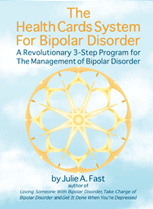
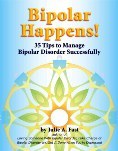
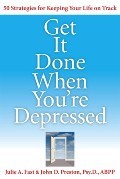
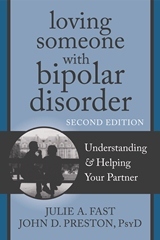
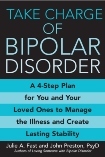
Related posts:
Accepting New Family and Partner Coaching Clients
Information on Julie’s books and coaching for parents and family members
Accepting New Family and Partner Coaching Clients
Julie A. Fast's Blog
- Julie A. Fast's profile
- 67 followers




